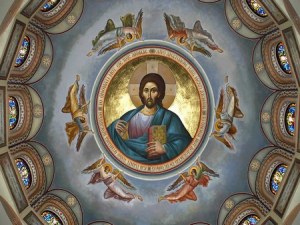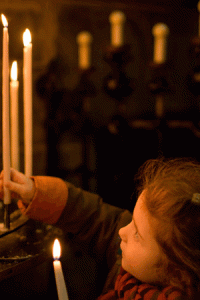O God, come to my assistance; O Lord, make haste to help me.
Fr. Patrick Reardon offers some wonderful background and insight into this earnest prayer in his book, Christ in the Psalms.
PSALM 69 (70)
Except for a few very minor variations, Psalm 69 is nearly identical to the final verses of Psalm 39. A plea for help in distress, it is a prayer appropriate to a great many circumstances in life. In fact, it is safe to say that the psalm’s opening line…has been prayed, over the centuries, more than any other line of the Psalter. There is a reason for this. In the sixth century, the great monastic code of the West, the Rule of St. Benedict, prescribed that each of the seven “day hours” (as distinct from Vigils, the midnight service) should begin with this verse, thus guaranteeing that it would be prayed at least seven times each day.
This usage became common in the West, even for nonmonastics. One finds it in the traditional roman Breviary, for example, and Archbishop Cranmer placed that verse at the beginning of the Anglican daily Evensong.
The roots of this usage, however, go back earlier to the Christian East, especially Egypt. A century before the rule of St. Benedict, the popularity of this prayer among Egyptian monks was observed by St. John Cassian, a Romanian monk who traveled extensively around the Mediterranean and finally settled in southern Gaul. The tenth book of Cassian’s great work, The Conferences, which is the second conference of Abba Isaac on prayer, most marvelously describes the efficacy of this psalm verse in all the circumstances of life. Whether in temptation or calm, says Abba Isaac, whether in fear or reassurance, whether in pain or pleasure, joy or sorrow, there are no circumstances in life when it is not supremely proper to pray: “O God, come to my assistance; O Lord, make haste to help me.” This prayer, he goes on, should never be absent from our lips.
As a simple doubling and slight expansion of the “Lord, have mercy,” this opening line of Psalm 69 became, then, one of the most important early formulas in the quest for constant prayer. It served as a kind of historical forerunner to the “Jesus Prayer” (“Lord Jesus Christ, Son of the living god, have mercy on me a sinner”).
After stating that this formula - “O God, come to my assistance; O Lord, make haste to help me” – had been handed down through the Egyptian monastic tradition from its most ancient fathers, with a view to attaining purity of heart and constant prayer, Abba Isaac continues:
Not without reason has this verse been selected from out of the whole body of Scripture. For it takes up all the emotions that can be applied to human nature and with great correctness and accuracy it adjusts itself to every condition and every attack. It contains an invocation of God in the face of any crisis, the humility of a devout confession, the watchfulness of concern and of constant fear, a consciousness of one’s own frailty, the assurance of being heard, and confidence in a protection that is always present and at hand, for whoever calls unceasingly on his protector is sure that he is always present. It contains a burning love and charity, an awareness of traps, and a fear of enemies.
Then several pages of Abba Isaac (as narrated by Cassian, in what may be counted among the most eloquent and carefully crafted paragraphs in all of Latin patristic literature), are devoted to the sundry and manifold circumstances in which it is proper to pray: “O God, come to my assistance; O Lord, make haste to help me.” Prayed from the heart, it places the mind constantly in communion with god.
The quest of the ancient Egyptian tradition, Isaac insists, was to make this formula a permanent invocation:
This verse should be poured out in unceasing prayer so that we may be delivered in adversity and preserved and not puffed up in prosperity. You should, I say, meditate constantly on this verse in your heart. You should not stop repeated it when you are doing any kind of work or performing some service, or are on a journey. Meditate on it while sleeping and eating and attending to the least needs of nature….Let it be the first thing that comes to you when you awake, let it anticipate every other thought as you get up, let it send you to your knees as your arise from your bed, let it bring you from there to every work and activity, and let it accompany you at all times.

